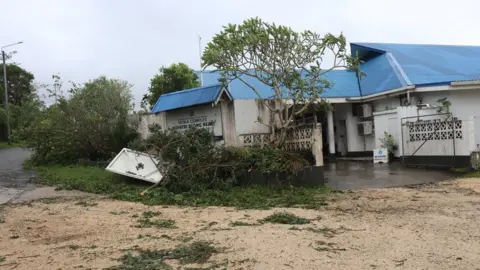Vanuatu: Pacific nation reels from twin cyclones and earthquake
 UNICEF Pacific
UNICEF PacificThe Pacific nation of Vanuatu has declared a state of emergency as it reels from an earthquake and two cyclones in as many days.
The 6.5 magnitude quake struck on Friday, a day after category four Cyclone Judy swept through the islands.
The storm caused widespread damage and flooding across the country. No casualties have been reported yet.
A category three storm, Cyclone Kevin, arrived on Friday, bringing destructive winds of up to 130km/h (81mph).
Hundreds of people had fled to evacuation centres in the capital Port Vila ahead of the second cyclone.
"We are a resilient people. We will get through this," Vanuatu's Prime Minister Ishmael Kalsakau told broadcaster RNZ Pacific on Friday.
Aid workers have described the situation as unprecedented.
"It's crazy, Vanuatu is used to natural disasters, but I think this is the first time it has had two cyclones back to back," said UNICEF's Eric Durpaire, according to AFP news agency.
He said he had heard reports that Wednesday's storm had ripped off the roof of an infants ward in Vanuatu Central Hospital.
Cyclone Judy flooded roads and uprooted trees after it cut a north to south path through the island.
Allow X content?

The Pacific state has already requested help from neighbours. Australia - a three hour plane ride away - said on Friday it would send water and medical supplies and a team of workers to assess the damage. New Zealand has also pledged assistance.
Vanuatu, a country of about 300,000 people, has been ranked the nation most prone to natural disasters by the United Nations.
It regularly experiences cyclones, and this week's disasters came as Vanuatu's UN mission secured a historic motion to ask the International Court of Justice to define what legal responsibility countries have for the changing climate and its impacts.
Vanuatu said securing the support of 105 other nations - including the UK, Canada and Australia - to co-sponsor the motion had been a "herculean diplomatic effort". China and the US - two of the world's biggest carbon emitters - did not sign on.
Pacific countries like Vanuatu have been at the forefront of legal climate change battles in recent years as rising sea levels, ocean acidification and the increased frequency and severity of natural disasters have been felt acutely across the region.
